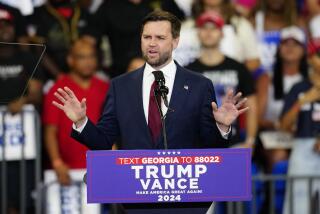Should the media not use James Holmes’ name?
Names have always been the subject of magical thinking -- the ancient Romans buried lead tablets invoking the names of spirits, gods or the dead in order to curse their enemies, just as one example -- so maybe it shouldn’t be too surprising that many people think uttering the name “James Holmes,” like an unguarded mention of the name “Voldemort” in J.K. Rowling’s Harry Potter series, will cause bad things to happen.
Holmes, the suspected killer of 12 in an Aurora, Colo., movie theater last week, is the subject of a name-censoring campaign started by the family of one of his victims. As Times staff writer Molly Hennessy-Fiske reported recently, what started out with a simple tweet by Jordan Ghawi, brother of 24-year-old shooting victim Jessica Ghawi, has not only gone viral, it has found a sympathetic ear in the world’s most powerful man -- President Obama declined to mention Holmes’ name in a speech Sunday after meeting with Ghawi. Multiple politicians, media outlets and reporters, including CNN’s Anderson Cooper, have also made a point of finding alternative ways to identify the accused killer.
The curse invoked by Holmes’ name, according to some, will take the form of other mass shootings. Indiscriminate killers seem to crave fame and notoriety; take those away, the theory goes, and there will be no reason for troubled loners of the future to strap on weapons and shoot up the local post office/mall/campus/movie theater.
WHO THEY WERE: Aurora movie theater victims
Ghawi’s appeal is more immediate and heartfelt. He and his family are upset that the media seem to be paying more attention to Holmes than the victims, and they think that should be reversed. That concern is certainly understandable, but it betrays a lack of insight into both the role of the media and the realities of human nature. There’s also the fact that this campaign can’t possibly work.
It is the job of the media to report the story, and Holmes’ name is part of it. For a newspaper to run a photo of a wild-eyed, orange-haired killer with the caption “Wild-eyed killer appears in court during pretrial hearing” would be to prejudge the case, editorialize on the news and do a disservice to readers by withholding a material fact. Moreover, the obsessive attention paid to Holmes in the wake of the killings is both natural and understandable: Actions like this are so incomprehensible to most people, yet happen with such regularity in this country, that we crave insights into what drives a person to fits of homicidal mania. Reporting on the circumstances of Holmes’ life and mind-set satisfy such curiosity and also, maybe, help us identify the warning signs of dangerous personalities in the future.
Would Holmes have avoided the whole thing if he thought the killings wouldn’t make him famous; was notoriety the key motivating factor? Nobody knows the answer to that except Holmes, and a glance at the oddly staring figure we’ve seen in TV reports suggests he’d have a tough time clearly articulating his reasons. But he’s already on Wikipedia, his name is the subject of a million Google searches and he is the topic of breathless coverage in TV, newspapers and radio around the world. This is not a train you can stop with a tweet. Nor can the awesome influence of Anderson Cooper, or even Obama, halt the flow of such a basic piece of information as a mass killer’s name.
For all that, I get Ghawi’s point: It isn’t fair that people like Holmes (or Osama bin Laden, or Charles Manson, or Timothy McVeigh, etc.) become internationally famous while the people they killed do not. That’s partially a function of numbers -- it would be tough to remember all the names of the 3,000 Americans killed in Bin Laden’s plot, but we can certainly recall his name. But mostly it’s a reflection of the nature of celebrity. One doesn’t have to be good to be famous, one just has to do something highly unusual. Slaughtering a dozen people in a movie theater is highly unusual. Being killed, unfortunately, isn’t. Fame isn’t fair.
ALSO:
Kinsley: What’s the next worst thing?
Subscribe to Dan Turner on Facebook
More to Read
A cure for the common opinion
Get thought-provoking perspectives with our weekly newsletter.
You may occasionally receive promotional content from the Los Angeles Times.










